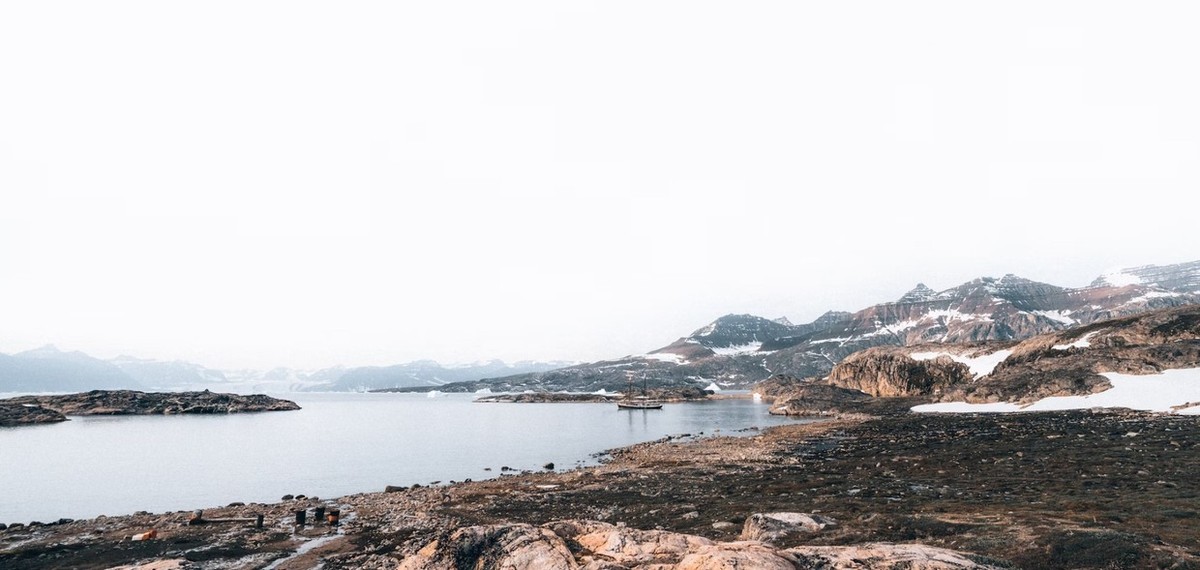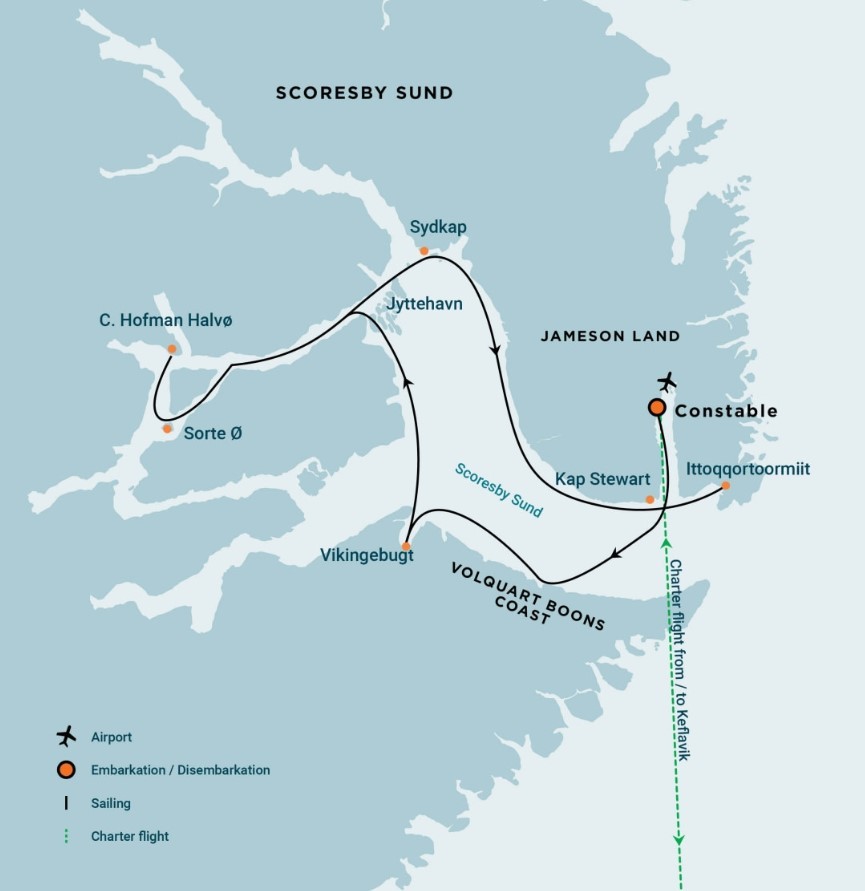
The East Greenland – Scoresby Sund cruise will spot huge icebergs as it journeys into the largest and deepest fjord system in the world. Along the way the Northern Lights is guiding our way.
- Northern Lights - One of the great attractions in the Arctic are the Northern Lights, also known as the Aurora Borealis
- Jameson Land - A peninsula in eastern Greenland, Jameson Land is known for its striking geological formations
- Sydkap - An area of Scoresby Sund where wildlife, striking terrain, and ancient Thule culture converge
- Musk Ox - Among the few hooved animals to survive the last ice age, these goat-like creatures have an underlayer of fur that is one of the world's warmest natural fibers
Prices quoted here are often dependent on currency fluctuations. Please check with (01432 507450 or info@small-cruise-ships.com) for the very latest price, which may well be cheaper than the one advertised here.



Prices quoted here are often dependent on currency fluctuations. Please check with (01432 507450 or info@small-cruise-ships.com) for the very latest price, which may well be cheaper than the one advertised here.



Prices quoted here are often dependent on currency fluctuations. Please check with (01432 507450 or info@small-cruise-ships.com) for the very latest price, which may well be cheaper than the one advertised here.



You arrive by chartered plane from Keflavik and land at Constable Pynt, the airfield at the head of Hurry Inlet. This area is known for its remarkably rich geological history.
Enjoy the sights as we sail the glaciated Volquart Boons Coast. Here you may set out on a Zodiac cruise along one of the shoreline glacier fronts, with your first activity near Månegletcher or Vikingebugt.
We sail by the east coast of Milne Land among a multitude of giant icebergs. If we can also land at Charcot Havn, we will make a walk to the Charcot Glacier before continuing by the Bjørneør and sail to Øfjord.
Today marks a visit to the east entrance of one of the most impressive fjords in the world: Ø Fjord is almost 40 nautical miles long (74 km, 46 miles), with mountains on each side up to 2,000 meters high (6,562 feet), and icebergs that drift over depths of more than 1,000 meters (3,281 feet). The aim is to land at Jyttehavn and hike the tundra in mythic surroundings. We may also sail into Harefjord, Rypefjord, and Rödefjord, walking into C. Hoffmanhalvöya and on Storö. We will then land near Sydkap, where you can see colossal icebergs, some of them over 100 meters (328 feet) high and more than a kilometer long (.62 mile). Most of these bergs are grounded, as the fjord is only about 400 meters deep (1,312 feet). At Sakatajik we can also view the remains of Thule winter houses. As many as twenty people lived here once, hunting Greenland whales and building houses out of their vertebrae. If there is not too much cloud cover, you might enjoy the magical lightshow of the aurora borealis today.
At the western shores of Jameson Land lies a vast tundra with grazing musk oxen. We will try to make a landing on one of the areas, such as Tyskit Nunat, remembering Alfred Wegener’s efforts to cross Vandreblokken. We may also visit Kap Hooker or a lovely lagoon west of Kap Stewart.
Today’s stop is Ittoqqortoormiit, the largest settlement in Scoresbysund at about five hundred inhabitants. At the post office you can buy stamps for your postcards or just stroll around to see the sled dogs and drying skins of seals and musk oxen.
In the morning you stop on the south coast of Jameson Land, at a lagoon near Kap Stewart. Here the waders and geese are collecting for their autumn migration, and musk oxen and collared lemmings survive on the meager vegetation. Further inside Hurry Inlet, you may take a walk near the head of the fjord as well as one of the rivers that terminate here. Here is a chance of a climb up the mountain of J.P. Koch Fjeld, near Hareelv. In this remarkable area, scientists found fossils that linked fish and amphibians in the lower Cretaceous period. You spend the night at anchor off Constable Pynt.
We take the chartered plane from Constable Pynt to Keflavik taking home memories for a lifetime.
All itineraries are for guidance only. Programs may vary depending on local ice, weather, and wildlife conditions. Landings are subject to site availabilities, permissions, and environmental concerns per AECO regulations. Official sailing plans and landing slots are scheduled with AECO prior to the start of the season, but the expedition leader determines the final plan. Flexibility is paramount for expedition cruises, and willingness to compromise on comfort is a basic requirement on board a historic sailing vessel. Important information about the use of sails: The vessel is equipped with sails to be used in good conditions (based on open sea, water depth, wind, and time allowance), but the use of sails is not guaranteed. The captain decides whether to use the sails or the engine. If sails are used, the crew will operate them. Guests must follow the safety instructions of the team. The average cruising speed for s/v Rembrandt van Rijn is 6.5 knots.
Rembrandt van Rijn

| Length | 56 metres |
|---|---|
| speed | 9 knots |
| Cabins | 16 |
S/V ‘Rembrandt Van Rijn’ was originally built as a herring lugger. The vessel was rebuilt as a three-masted passenger sailing schooner in The Netherlands in 1994 and sailed in Spitsbergen (1994 – 1996) and in Galápagos (1998 - 2001). The vessel underwent a complete rebuilding and refurbishment program in 2011. The communication and navigation equipment has been completely renewed according to the latest SOLAS regulations.
The Rembrandt van Rijn measures 56 meters in length (168 ft.), 7 meters in width and has a draft of 2, 5 meters.
•The maximum engine speed is 9 knots
•She has an experienced crew of 12 on board including two tour guides
•The ship can accommodate a maximum of 33 passengers in 16 cabins
•1 Triple Private cabin with porthole (with shower and toilet)
•6 Twin Private Inside cabins (with shower and toilet, no porthole)
•9 Twin Private cabins (with shower and toilet and porthole)
•The general interior public areas include a spacious restaurant area so that all meals can be taken together as well as separate bar area and reading table area
•There is room to relax, read and socialize
•The ship is well suited for expedition cruising among small islands and offers excellent open deck viewing areas, even when under sail. The two inflatable rubber crafts (zodiacs) enable landing and wildlife viewing opportunities in otherwise inaccessible areas.



